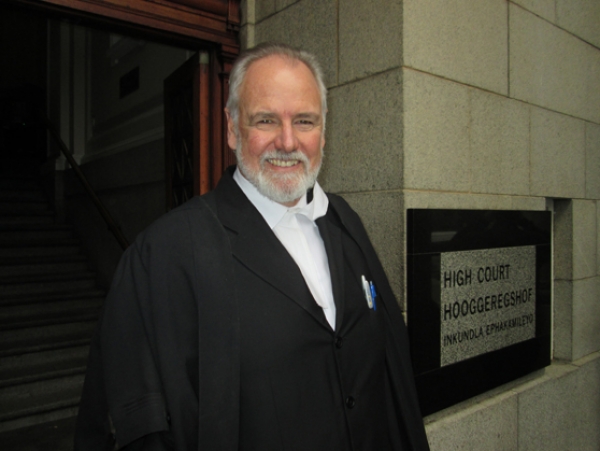Angy Peter trial: judge wants police to explain mistakes

Police statements to the media after the arrest of Social Justice Coalition activists came under the spotlight in the Angy Peter trial today.
Peter, her husband Isaac Mbadu, Christopher Dina and Azola Dayimani are accused of the murder of Rowan Du Preez.
Defence advocate William King SC questioned Detective Constable Standford Muthian about his role in the statements, which King said suggested that Peter and Mbadu had murdered Du Preez in a vigilante attack as revenge after he had broken into their house and stolen their TV.
He said the statements had been released soon before the Commission of Inquiry into Policing in Khayelitsha was about to start. The SJC had petitioned Western Cape Premier Helen Zille to establish that commission, King said, and the police were hostile to the establishment of the commission to the point that the Minister of Police had gone to the Constitutional Court in an attempt to prevent it.
King told the Western Cape High Court that the defence considered the police had used the media to tarnish the SJC by linking Peter and Mbadu to a vigilante murder.
Muthian was questioned about his knowledge of the Khayelitsha Commission. He said he didn’t know much.
Judge Robert Henney also criticised the police statements, which he said were factually inaccurate, because two of the accused were not SJC activists.
He said he had to call Muthian, after both the state and the defence had closed their cases, to explain several mistakes. He said it was for the first time in his experience that the lead investigator had not been called to testify on his investigation.
“The lead investigator is usually the star of the state case.”
He said poor police investigations were one of the reasons why the SJC had called for the Khayelitsha commission of inquiry.
Prosecutor Phistus Pelesa conceded there were holes in the state case and blamed Muthian for his failure to investigate certain elements.
King said procedures had been flouted when police went to arrest Peter. Police had used John Ndevu, who knew the accused, to identify her when proper procedure would have been to get a witness to a crime to point out the suspect.
For the second day in a row, King also questioned inconsistencies in the marking of documents in the police docket.
The previous day, Muthian had acknowledged that he had not conducted his own investigation into the murder. He had only collected statements from several witnesses to compile a police docket.
Muthian said he had followed instructions from his superiors and had done only what he was told to do.
King said information in the docket was incoherent and not arranged in sequence or numbered properly. He pointed out two documents which were marked the same but contained different matters.
He also referred the court to the pocket book of a police officer which had emerged during the trial though the officer had sworn that it was missing.
He questioned Muthian on statements from state witnesses who denied in court part of what had been said in the statements, and about his failure to search the house of the accused for forensic evidence which might link them to crime scene.
Muthian did not explain why he did not conduct the search or give reasons why two state witnesses, Ntsikelelo Dlabantu and Roger Zigange, who said they were together, had given two different statements.
Muthian also conceded that he did not know what the motive of the four accused was.
King asked, “If there was no motive why did they do it?”
Muthian said he did not know. King accused him of fabricating evidence to incriminate Peter and Mbadu.
King pointed out that there were people in the community who had wanted Du Preez dead and that he had been assaulted on August 2012, three months before his murder.
It also emerged that Muthian had met Western Cape Police Commissioner General Arno Lamoer after an article about the arrest of Peter had appeared in the Mail and Guardian.
King asked if he had been given instructions on how to handle the case. Muthian said that he could not discuss what had been said at that meeting but that he had sent regular feedback to Lamoer by email.
The trial continues on Monday.

This article is licensed under a Creative Commons Attribution-NoDerivatives 4.0 International License.


